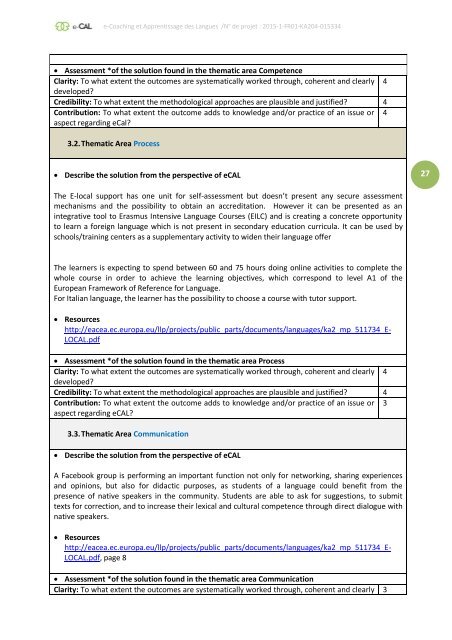e-CAL - e-Coaching et Apprentissage des Langues
The ERASMUS+ project e-CAL presents the result of an analysis of support methods in the case of language learning using web-based Open Educational Resources (OER).
The ERASMUS+ project e-CAL presents the result of an analysis of support methods in the case of language learning using web-based Open Educational Resources (OER).
Create successful ePaper yourself
Turn your PDF publications into a flip-book with our unique Google optimized e-Paper software.
e-<strong>Coaching</strong> <strong>et</strong> <strong>Apprentissage</strong> <strong>des</strong> <strong>Langues</strong> /N° de proj<strong>et</strong> : 2015-1-FR01-KA204-015334<br />
Assessment *of the solution found in the thematic area Comp<strong>et</strong>ence<br />
Clarity: To what extent the outcomes are systematically worked through, coherent and clearly 4<br />
developed?<br />
Credibility: To what extent the m<strong>et</strong>hodological approaches are plausible and justified? 4<br />
Contribution: To what extent the outcome adds to knowledge and/or practice of an issue or 4<br />
aspect regarding eCal?<br />
3.2. Thematic Area Process<br />
Describe the solution from the perspective of e<strong>CAL</strong><br />
27<br />
The E-local support has one unit for self-assessment but doesn’t present any secure assessment<br />
mechanisms and the possibility to obtain an accreditation. However it can be presented as an<br />
integrative tool to Erasmus Intensive Language Courses (EILC) and is creating a concr<strong>et</strong>e opportunity<br />
to learn a foreign language which is not present in secondary education curricula. It can be used by<br />
schools/training centers as a supplementary activity to widen their language offer<br />
The learners is expecting to spend b<strong>et</strong>ween 60 and 75 hours doing online activities to compl<strong>et</strong>e the<br />
whole course in order to achieve the learning objectives, which correspond to level A1 of the<br />
European Framework of Reference for Language.<br />
For Italian language, the learner has the possibility to choose a course with tutor support.<br />
Resources<br />
http://eacea.ec.europa.eu/llp/projects/public_parts/documents/languages/ka2_mp_511734_E-<br />
LO<strong>CAL</strong>.pdf<br />
Assessment *of the solution found in the thematic area Process<br />
Clarity: To what extent the outcomes are systematically worked through, coherent and clearly 4<br />
developed?<br />
Credibility: To what extent the m<strong>et</strong>hodological approaches are plausible and justified? 4<br />
Contribution: To what extent the outcome adds to knowledge and/or practice of an issue or 3<br />
aspect regarding e<strong>CAL</strong>?<br />
3.3. Thematic Area Communication<br />
Describe the solution from the perspective of e<strong>CAL</strong><br />
A Facebook group is performing an important function not only for n<strong>et</strong>working, sharing experiences<br />
and opinions, but also for didactic purposes, as students of a language could benefit from the<br />
presence of native speakers in the community. Students are able to ask for suggestions, to submit<br />
texts for correction, and to increase their lexical and cultural comp<strong>et</strong>ence through direct dialogue with<br />
native speakers.<br />
Resources<br />
http://eacea.ec.europa.eu/llp/projects/public_parts/documents/languages/ka2_mp_511734_E-<br />
LO<strong>CAL</strong>.pdf, page 8<br />
Assessment *of the solution found in the thematic area Communication<br />
Clarity: To what extent the outcomes are systematically worked through, coherent and clearly 3


